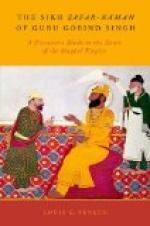|
This section contains 1,524 words (approx. 6 pages at 300 words per page) |

|
SINGH, GOBIND (1666–1708), the last of the ten gurūs ("teachers") of Sikhism. After his death the Sikh gurū was understood to be the Ādi Granth, the sacred book. Until Gobind Singh, the Sikh community, whose religious ideals and practices were a North Indian combination of Vaiṣṇava devotional movements from South India and elements of Islamic Sufism, had been led by a series of gurūs beginning with Nānak (1469–1539) and passing through to Gobind Singh's father, the ninth gurū, Tegh Bahādur.
Gobind Singh (originally Gobind Rāi) is known as the paradigm of the chivalrous, proud, martial, and loyal religious ideal to which members of the Sikh Khālsā, "the community of pure ones," aspire. In fact, it was Gobind Singh who established the Khālsā, and gave all male Sikhs the surname Singh ("lion") and Sikh women the name Kaur ("lioness"). Gobind Singh...
|
This section contains 1,524 words (approx. 6 pages at 300 words per page) |

|


